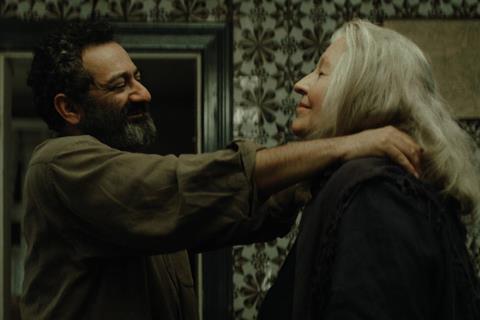German islands-set drama plays in Berlin Competition

Dir/scr: Ameer Fakher Eldin. Germany/Canada/France/Italy/Palestine/Jordan. 2025. 124mins
A series of low-lying German islands that have learned to live with seasonal flooding are both setting and metaphor in Palestinian writer-director Ameer Fakher Eldin’s quiet, atmospheric yet also rather hermetically-sealed second feature. Cutaways to a fable-within-the-film that plays out in an arid Middle Eastern landscape suggest an allegory of lost or displaced homelands, but Eldin, who was born in Kyiv to Syrian parents from the disputed Golan Heights, leaves the symbolic import of this poetic feature wide open to interpretation.
Eldin has a real knack for cinematic mood painting
Presented in Competition at the 2025 Berlinale, Yunan is the second part of a trilogy the director has called ‘Homeland’, that began with his well-received 2021 debut The Stranger. (Eldin is already at work on the final part, Nostalgia: A Tale In Its First Chapters). Those hungry for new auteurs may be curious to catch Yunan, a film which confirms Eldin has a real knack for cinematic mood painting, in further festival play, at least. (It has already wrapped deals for co-pro territories Germany and Canada.)
Lebanese actor Georges Khabbaz, best known for his role in Under Te Bombs, plays Munir, a depressed writer living in Hamburg. When a doctor prescribes rest for his stress-related panic attacks, Munir travels by train and ferry to the Hallig islands off the coast of northern Germany. There’s no room at the islands’ solitary inn – the only accommodation wary but kindly landlady Valeska (Hanna Schygulla) can offer is a dilapidated house awaiting restoration. Munir takes it, because when you’ve decided to end it all (an intention flagged pretty much from the get-go), anywhere will do.
But the desperately melancholic writer’s creative block also leaves him unable to pull the trigger, and so he roams this flat, windy waterscape, braving bulls in fields, listening to the gale, the gulls and the rising sea – part of a rich soundscape that merges with the swarming notes of Suad Bushnaq’s evocative soundtrack. His otherness is commented only in hostile glances – especially from Valeska’s young adult son Karl (Tom Wlaschiha) – or studious avoidance by the few ruddy-faced islanders. Only Valeska herself, a grounded character who emanates a pleasant Zen calmness, accepts him without questions.
Interleaved with the Hallig island sections are a series of insets involving a story that Munir’s dementia-afflicted mother likes to recount – about a mute shepherd who lives in an arid Biblical landscape with his flocks and beautiful young wife. Shot in Italy’s Puglia region but clearly supposed to evoke an archaic rural Palestine, this fable is suggestive without being incisive. Certainly the contrast between two pastoral communities is stark – one dry, steep and rocky, the other green and so soaked in water it can’t absorb any more.
Production companies: Red Balloon Film, Microclimat Films, Intramovies
International sales: Intramovies, mail@intramovies.com / MENA sales: Mad Distribution, info@mad-solutions.com
Producers: Dorothy Beinemeier, Catherine Chagnon, Marco Valerio Fusco, Michaela Fusco, Tony Copti, Jiries Copti
Cinematography: Ronald Plante
Production design: Marie-Luise Balzer
Editing: Ameer Fakher Eldin
Music: Suad Bushnaq
Main cast: Georges Khabbaz, Hanna Schygulla, Ali Suliman, Sibel Kekilli, Tom Wlaschiha, Nidal Al Achkar





















